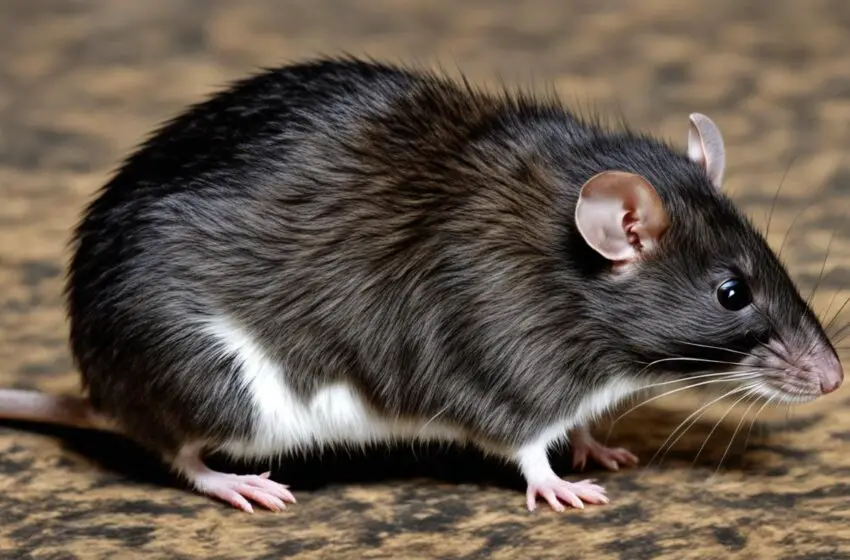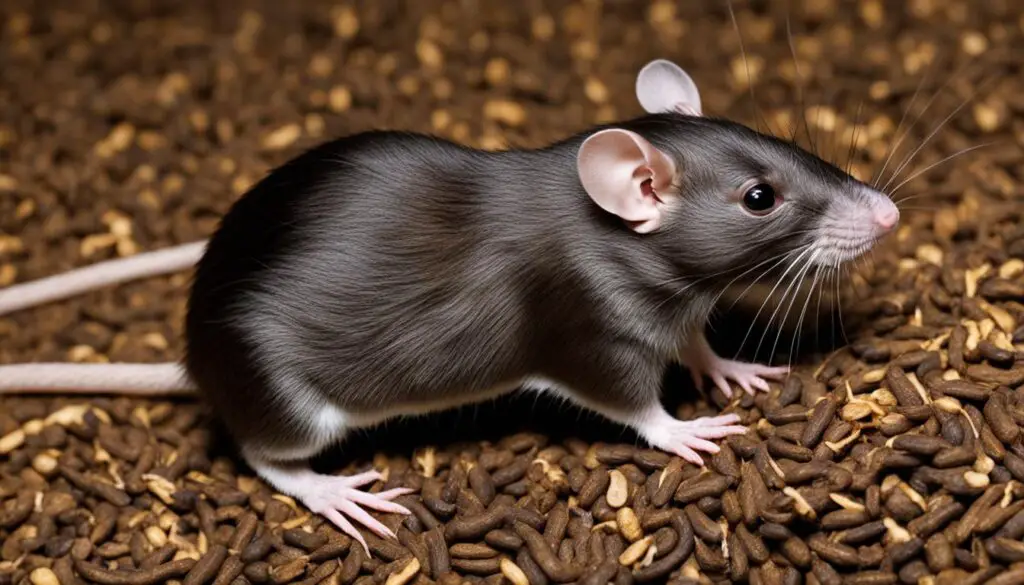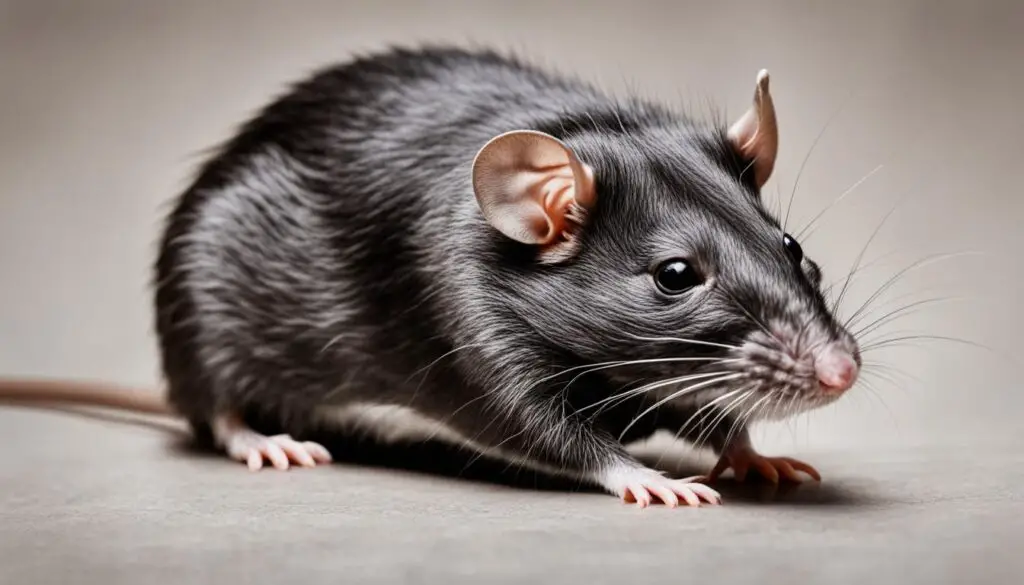How to Detect Early Signs of Illness in Pet Rats

As a responsible pet owner, I understand the importance of ensuring the health and wellbeing of our furry friends. This includes being proactive in detecting early signs of illness in our pet rats. By paying close attention to their physical symptoms, behavioral changes, and eating habits, we can provide timely care and prevent potential health complications.
Pet rats, like any other animals, can fall ill. However, they are experts at hiding their discomfort, making it crucial for us to be vigilant in spotting any signs that may indicate illness. By familiarizing ourselves with the early indicators of illness, we can take the necessary steps to address the issue and ensure the best possible care for our beloved pets.
Key Takeaways:
- Monitor physical symptoms such as loss of appetite, weight loss, and changes in fur or skin condition.
- Pay attention to behavioral changes like decreased activity levels, increased aggression, and excessive hiding.
- Observe eating and drinking habits for any abnormalities, such as a decrease in appetite or refusal to eat or drink.
- Be aware of digestive issues, urinary problems, dental problems, and eye problems.
- If you notice any concerning signs, consult a veterinarian who specializes in small mammals for guidance and treatment.
Physical Symptoms to Watch Out For
Pet rats, like any living beings, can experience illness from time to time. It’s crucial for rat owners to be vigilant and recognize the physical symptoms of illness in their furry companions. By closely monitoring these signs, you can provide timely care and ensure the well-being of your pet rats.
Here are some physical symptoms that may indicate illness in rats:
- Loss of appetite: A significant decrease in food consumption or refusal to eat altogether.
- Weight loss: Noticeable decrease in body weight despite regular feeding.
- Lethargy: Unusual tiredness or lack of energy.
- Abnormal posture or movements: Rats may exhibit hunching, arching, or stiffness in their body.
- Respiratory issues: Coughing, sneezing, wheezing, or difficulty breathing.
- Changes in fur or skin condition: Rats may have rough, patchy, or discolored fur, along with scabs or sores on the skin.
Early detection of these physical symptoms can help you identify potential health problems in your pet rats. If you notice any of these signs, it’s important to consult a veterinarian who specializes in small mammals for a proper diagnosis and treatment.
While the presence of these physical symptoms may indicate illness, it’s important to remember that they are not exclusive to a single condition. Only a qualified veterinarian can accurately diagnose your pet rat’s health and prescribe appropriate treatment. Therefore, prompt veterinary care is crucial when it comes to dealing with sick pet rats.
Behavioral Changes as Warning Signs
In addition to physical symptoms, changes in behavior can also indicate illness in pet rats. It is crucial to observe their behavior and be aware of any unusual or abnormal signs. Here are some behavioral changes that may serve as warning signs:
- Decreased activity levels: If your pet rat suddenly becomes less active or shows a noticeable decline in energy, it may be an indication of an underlying health issue.
- Huddling in corners: Rats tend to seek out warmth and comfort in their surroundings. However, if you notice your rat frequently huddled in corners or isolated from its cage mates, it could suggest something is wrong.
- Aggression or irritability: Uncharacteristic aggression or irritability towards humans or cage mates can be a sign of stress or discomfort caused by illness.
- Increased aggression towards cage mates: If your rat displays heightened aggression towards its cage mates, it could be a result of illness and a sign that it needs medical attention.
- Changes in grooming habits: Rats are naturally clean animals and spend a significant amount of time grooming themselves. However, a sudden decrease in grooming behaviors or a change in the appearance of their coat may indicate an underlying health problem.
- Excessive hiding: While rats may seek some privacy in their hideouts, excessive hiding or isolation from usual activities can be a sign of distress or illness.
Remember, recognizing these behavioral changes is key to ensuring the well-being of your pet rat. Prompt action and veterinary care can make a significant difference in their overall health and longevity.
Next, let’s explore the abnormal eating and drinking habits that can serve as indicators of illness in pet rats.
| Behavioral Signs of Illness in Pet Rats | Physical Symptoms of Illness in Rats |
|---|---|
| Decreased activity levels | Loss of appetite |
| Huddling in corners | Weight loss |
| Aggression or irritability | Lethargy |
| Increased aggression towards cage mates | Abnormal posture or movements |
| Changes in grooming habits | Respiratory issues (coughing, sneezing) |
| Excessive hiding | Changes in fur or skin condition |

Abnormal Eating and Drinking Habits
Monitoring your pet rats’ eating and drinking habits is crucial in detecting illness. Pay attention to any significant changes, such as a decrease in appetite, refusal to eat or drink altogether, or increased consumption of water. These abnormal eating and drinking habits can be signs of various health conditions, and immediate veterinary attention may be required.
If you notice any decrease in appetite in your pet rat, it could be an indication of an underlying health issue. Loss of interest in food or treats that were once eagerly consumed may signal a problem. Additionally, if your pet rat refuses to eat or drink altogether for more than a day, it is critical to seek veterinary care promptly as rats require regular food and water intake for their well-being.
Increased consumption of water can also be a cause for concern. If your pet rat is drinking noticeably more than usual, it may be an indication of dehydration or an underlying medical condition. Excessive thirst can be a sign of diabetes, kidney problems, or other issues that require veterinary evaluation.
Pet rats rely on consistent and balanced nutrition for their health. Any changes in their eating and drinking habits should be taken seriously as they can be indicative of illness or discomfort. It is essential to consult with a veterinarian experienced in small animals if you observe abnormal eating and drinking behaviors in your pet rats.
Digestive and Urinary Issues
Digestive and urinary issues are common in pet rats and should not be ignored. It is important to be aware of the signs of illness in rats and seek prompt veterinary care when necessary. Here are some common symptoms to watch out for:
Signs of Digestive Problems in Pet Rats
1. Diarrhea: Loose or watery stools can indicate digestive issues in rats.
2. Constipation: Difficulty passing stool or infrequent bowel movements may be a sign of a digestive problem.
3. Bloating: Swelling or distension in the abdominal area can suggest gastrointestinal discomfort.
4. Changes in appetite: Rats with digestive problems may experience a loss of appetite or reduced food intake.
Signs of Urinary Issues in Rats
1. Difficulty urinating: Straining or pain during urination may be an indication of urinary problems.
2. Blood in urine: If you notice blood in your rat’s urine, it could be a sign of an underlying urinary issue.
3. Changes in urination frequency: An increase or decrease in the frequency of urination can be a cause for concern.
If you observe any of these symptoms in your pet rat, it is important to consult a veterinarian specializing in small mammals. They can assess your rat’s condition and provide appropriate treatment to address the underlying health problem.

| Common Digestive and Urinary Issues in Rats | Symptoms | Treatment |
|---|---|---|
| Gastrointestinal infection | Diarrhea, bloating, loss of appetite | Antibiotics, supportive care |
| Urinary tract infection | Difficulty urinating, blood in urine | Antibiotics, increased water intake |
| Urinary stones | Painful urination, blood in urine | Surgery, dietary changes |
| Digestive blockage | Constipation, bloating, discomfort | Surgery, dietary changes, laxatives |
Remember, early detection and intervention are key to managing digestive and urinary issues in pet rats. By monitoring your rat’s health and seeking veterinary care as soon as you notice any signs of illness, you can help ensure a happy and healthy life for your furry friend.
Dental and Eye Problems
Dental and eye problems can be common in pet rats and can significantly impact their overall health and well-being. It is crucial for rat owners to be aware of the signs and symptoms associated with these issues to provide timely and appropriate care.
Dental Issues
Rats have constantly growing teeth, and when their teeth become overgrown or misaligned, it can lead to various dental problems. Watch out for signs such as:
- Overgrown or misaligned teeth: Rats with dental issues may have visibly long or crooked teeth.
- Drooling: Excessive drooling or a wet chin can be an indication of dental discomfort.
- Difficulty eating: Rats with dental problems may struggle to chew their food properly or avoid eating altogether.
If you observe any of these symptoms, it’s essential to seek veterinary intervention. Ignoring dental issues can lead to pain, difficulty eating, and even secondary health problems.
Eye Problems
Eye problems can also affect pet rats and should not be overlooked. Keep an eye out for the following signs:
- Redness or discharge in the eyes: If you notice any unusual redness, discharge, or crustiness around the eyes, it could indicate an underlying eye problem.
- Cloudiness in the cornea: A cloudy appearance in the rat’s cornea may be a sign of an infection or injury.
- Excessive tearing: Rats with eye problems may have watery eyes or tear stains around the eye area.
When eye problems are left untreated, they can lead to discomfort, vision impairment, and potential complications. Therefore, it is vital to consult with a veterinarian experienced in rat health if you notice any concerning eye symptoms in your pet.
The image above highlights the importance of regular dental and eye examinations for pet rats.
Conclusion
Regular and attentive monitoring of your pet rats’ health is essential for detecting illness early on. By being aware of physical symptoms, behavioral changes, abnormal eating and drinking habits, digestive and urinary issues, as well as dental and eye problems, you can provide prompt care and ensure the wellbeing of your furry companions. If you notice any concerning signs, consult a veterinarian who specializes in small mammals to receive appropriate guidance and treatment.
FAQ
What are the early signs of illness in pet rats?
Early signs of illness in pet rats can include loss of appetite, weight loss, lethargy, abnormal posture or movements, respiratory issues such as coughing or sneezing, and changes in their fur or skin condition.
How can I detect illness in pet rats based on their behavior?
Behavioral changes can indicate illness in pet rats. Look out for signs such as decreased activity levels, huddling in corners, aggression or irritability, increased aggression towards cage mates, changes in grooming habits, or excessive hiding.
What should I monitor in my pet rats’ eating and drinking habits?
Monitoring your pet rats’ eating and drinking habits is crucial in detecting illness. Pay attention to any significant changes, such as a decrease in appetite, refusal to eat or drink altogether, or increased consumption of water.
What are some digestive and urinary issues I should watch out for in pet rats?
Digestive and urinary issues are common in pet rats. Look out for symptoms like diarrhea, constipation, bloating, difficulty urinating, blood in urine, or changes in the frequency of urination.
What dental and eye problems can affect the health of my pet rats?
Dental and eye problems can also affect the health of your pet rats. Keep an eye out for signs like overgrown or misaligned teeth, drooling, difficulty eating, redness or discharge in the eyes, cloudiness in the cornea, or excessive tearing.
Why is it important to monitor the health of my pet rats regularly?
Regular and attentive monitoring of your pet rats’ health is essential for detecting illness early on. By being aware of physical symptoms, behavioral changes, abnormal eating and drinking habits, digestive and urinary issues, as well as dental and eye problems, you can provide prompt care and ensure the wellbeing of your furry companions. If you notice any concerning signs, consult a veterinarian who specializes in small mammals to receive appropriate guidance and treatment.



